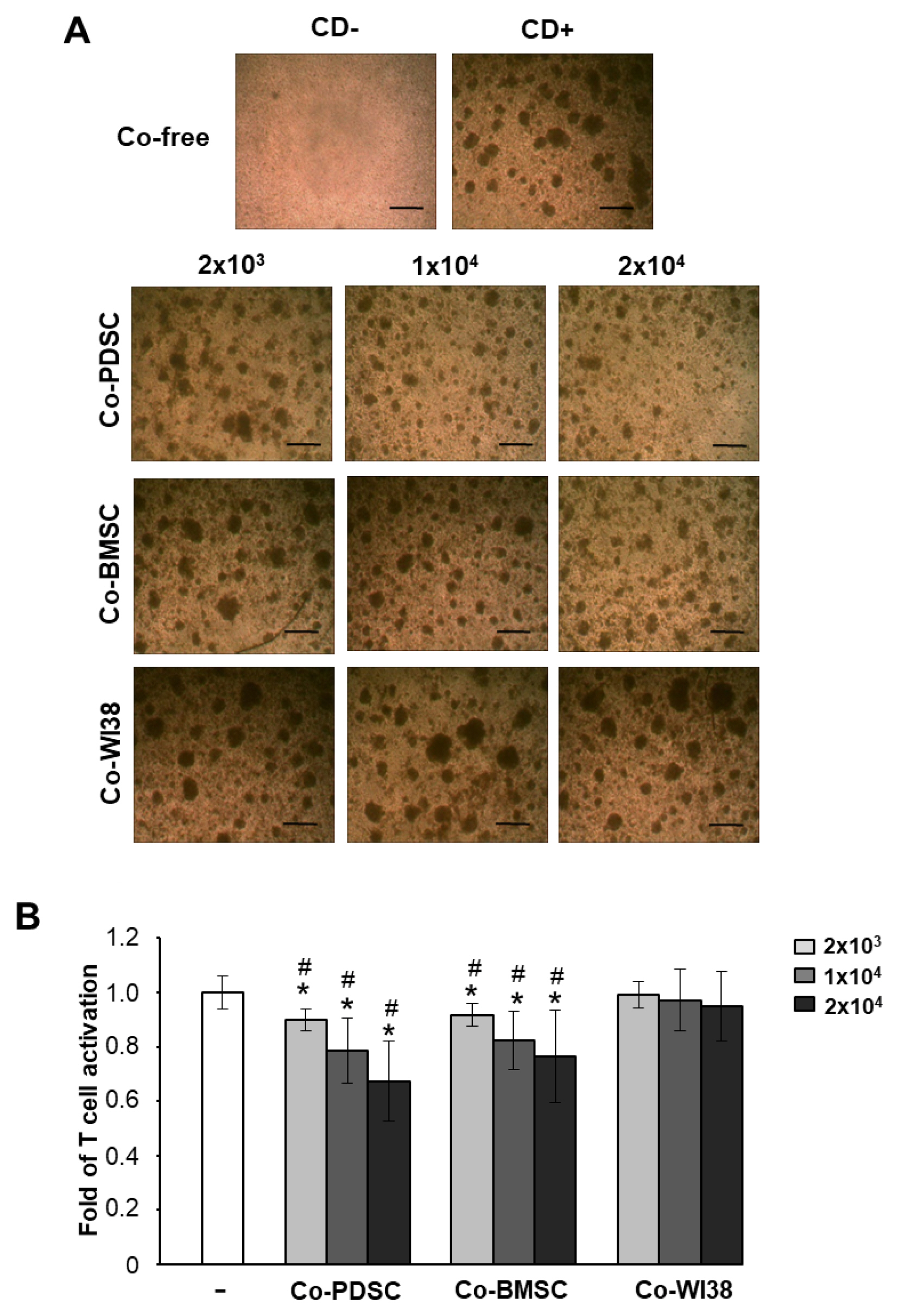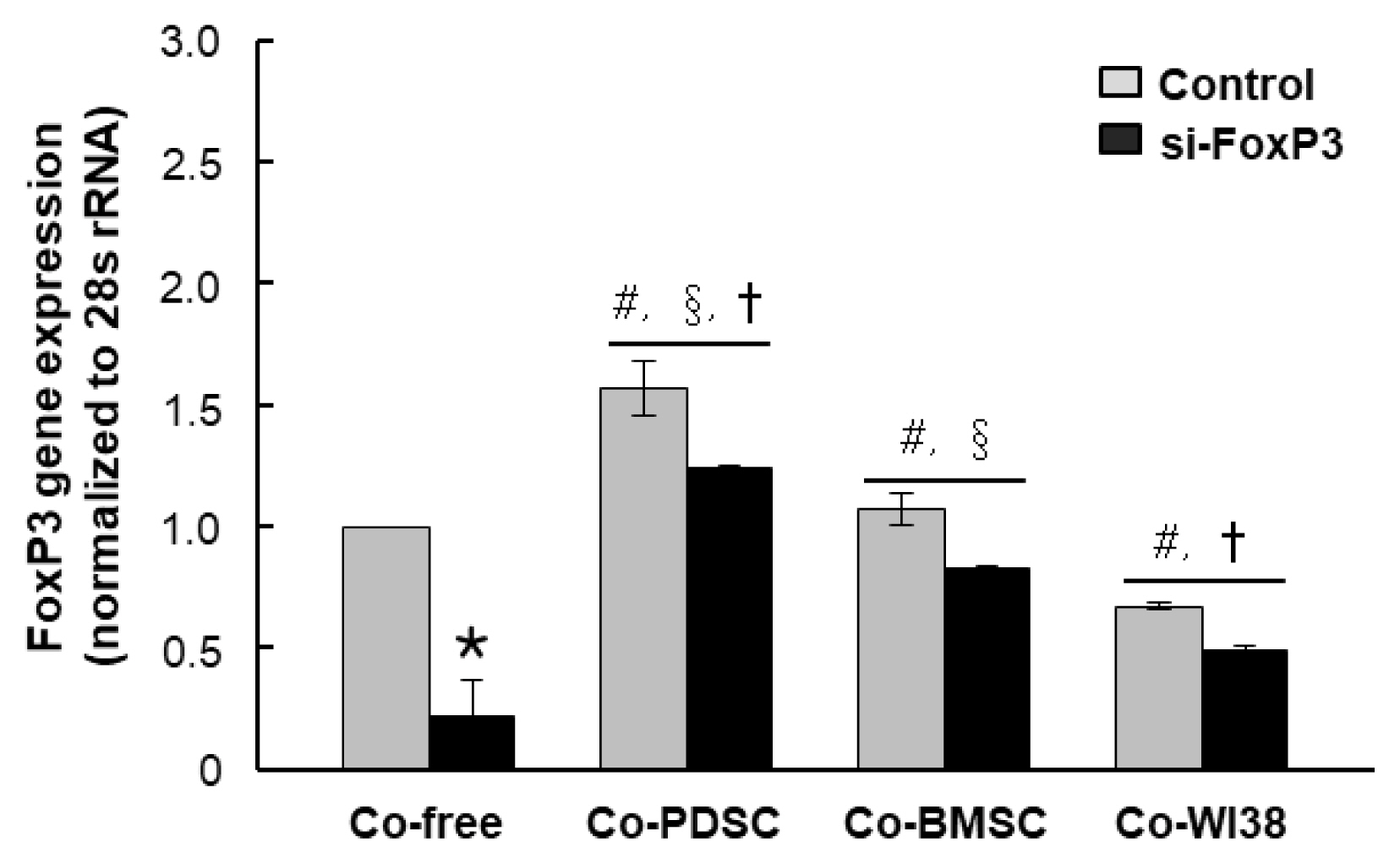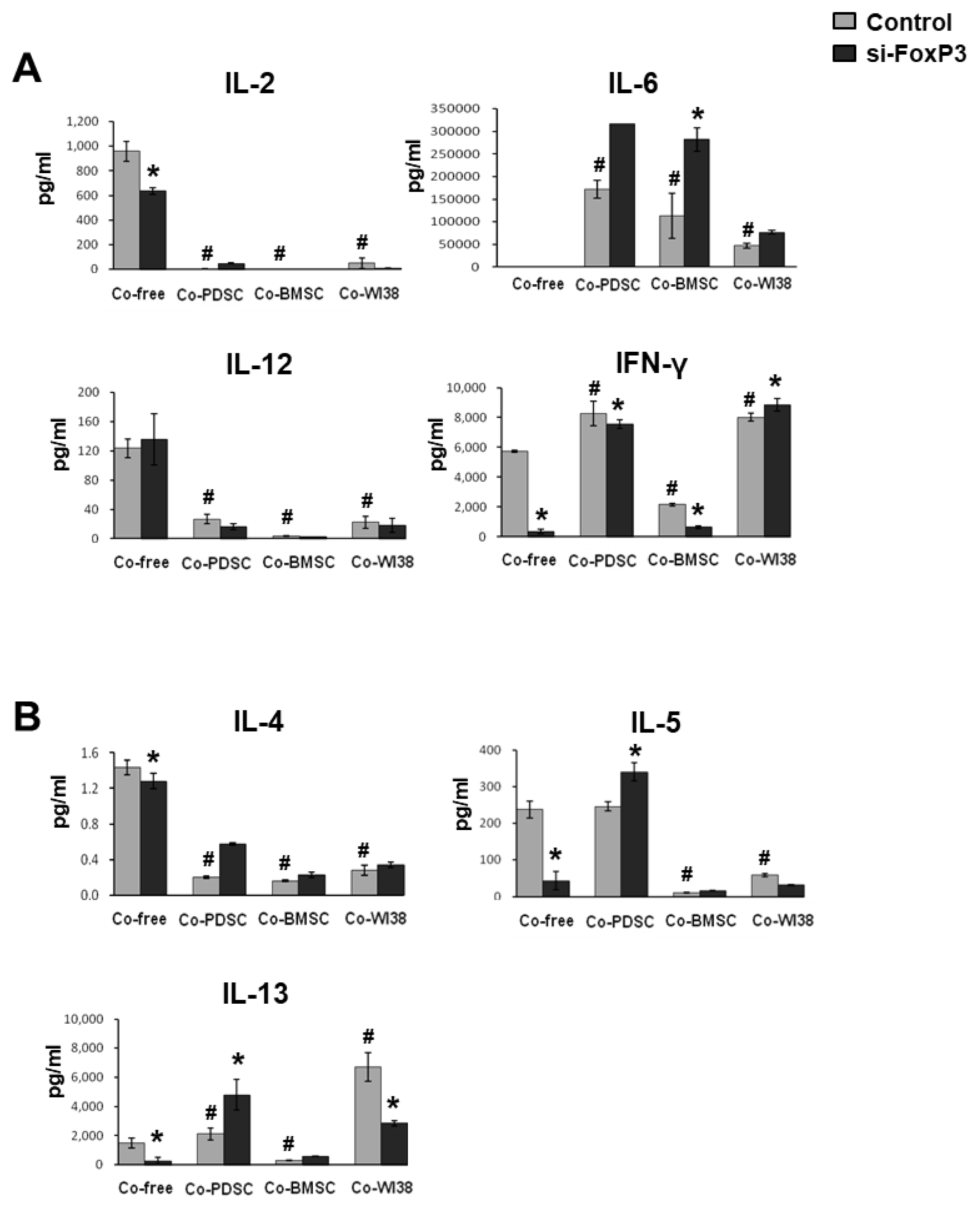Int J Stem Cells.
2018 Nov;11(2):196-204. 10.15283/ijsc18031.
Immunomodulatory Effects of Placenta-derived Mesenchymal Stem Cells on T Cells by Regulation of FoxP3 Expression
- Affiliations
-
- 1Department of Integrated Biomedical and Life Science, Graduate School, Korea University, Seoul, Korea. seunggwan@korea.ac.kr
- 2Department of Biomedical Laboratory Science, Gimcheon University, Gimcheon, Korea.
- 3Placenta Research Laboratory, Department of Biomedical Science, CHA University, Seongnam, Korea. gjkim@cha.ac.kr
- 4Faculty of Health and Environmental Science, College of Health Science, Korea University, Seoul, Korea.
- 5Department of Biomedical Laboratory Science, Jungwon University, Goesan, Korea.
- KMID: 2429552
- DOI: http://doi.org/10.15283/ijsc18031
Abstract
- The immunomodulatory effects of mesenchymal stem cells (MSCs) are an important mediator of their therapeutic effects in stem cell therapy and regenerative medicine. The regulation mechanism of MSCs is orchestrated by several factors in both intrinsic and extrinsic events. Recent studies have shown that the dynamic expression of cytokines secreted from MSCs control T cell function and maturation by regulating the expression of FoxP3, which figures prominently in T cell differentiation. However, there is no evidence that placenta-derived mesenchymal stem cells (PD-MSCs) have strong immunomodulatory effects on T cell function and maturation via FoxP3 expression. Therefore, we compared the expression of FoxP3 in activated T cells isolated from peripheral blood and co-cultured with PD-MSCs or bone marrow-derived mesenchymal stem cells (BM-MSCs) and analyzed their effect on T cell proliferation and cytokine profiles. Additionally, we verified the immunomodulatory function of PD-MSCs by siRNA-mediated silencing of FoxP3. MSCs, including PD-MSCs and BM-MSCs, promoted differentiation of naive peripheral blood T cells into CD4+CD25+FoxP3+ regulatory T (Treg) cells. Intriguingly, the population of CD4+CD25+FoxP3+ Treg cells co-cultured with PD-MSCs was significantly expanded in comparison to those co-cultured with BM-MSCs or WI38 cells (p < 0.05, p < 0.001). Dynamic expression patterns of several cytokines, including anti- and pro-inflammatory cytokines and members of the transforming growth factor-beta (TGF-β) family secreted from PD-MSCs according to FoxP3 expression were observed. The results suggest that PD-MSCs have an immunomodulatory effect on T cells by regulating FoxP3 expression.
Keyword
MeSH Terms
Figure
Reference
-
References
1. Nauta AJ, Fibbe WE. Immunomodulatory properties of mesenchymal stromal cells. Blood. 2007; 110:3499–3506. DOI: 10.1182/blood-2007-02-069716. PMID: 17664353.
Article2. Quaedackers ME, Baan CC, Weimar W, Hoogduijn MJ. Cell contact interaction between adipose-derived stromal cells and allo-activated T lymphocytes. Eur J Immunol. 2009; 39:3436–3446. DOI: 10.1002/eji.200939584. PMID: 19798683.
Article3. Engela AU, Baan CC, Dor FJ, Weimar W, Hoogduijn MJ. On the interactions between mesenchymal stem cells and regulatory T cells for immunomodulation in transplantation. Front Immunol. 2012; 3:126. DOI: 10.3389/fimmu.2012.00126. PMID: 22629256. PMCID: 3355477.
Article4. Prasanna SJ, Gopalakrishnan D, Shankar SR, Vasandan AB. Pro-inflammatory cytokines, IFNgamma and TNFalpha, influence immune properties of human bone marrow and Wharton jelly mesenchymal stem cells differentially. PLoS One. 2010; 5:e9016. DOI: 10.1371/journal.pone.0009016. PMID: 20126406. PMCID: 2814860.5. Hoogduijn MJ, Popp F, Verbeek R, Masoodi M, Nicolaou A, Baan C, Dahlke MH. The immunomodulatory properties of mesenchymal stem cells and their use for immunotherapy. Int Immunopharmacol. 2010; 10:1496–1500. DOI: 10.1016/j.intimp.2010.06.019. PMID: 20619384.
Article6. Hoogduijn MJ, Popp FC, Grohnert A, Crop MJ, van Rhijn M, Rowshani AT, Eggenhofer E, Renner P, Reinders ME, Rabelink TJ, van der Laan LJ, Dor FJ, Ijzermans JN, Genever PG, Lange C, Durrbach A, Houtgraaf JH, Christ B, Seifert M, Shagidulin M, Donckier V, Deans R, Ringden O, Perico N, Remuzzi G, Bartholomew A, Schlitt HJ, Weimar W, Baan CC, Dahlke MH. Advancement of mesenchymal stem cell therapy in solid organ transplantation (MISOT). Transplantation. 2010; 90:124–126. DOI: 10.1097/TP.0b013e3181ea4240. PMID: 20606604.
Article7. Tolar J, Villeneuve P, Keating A. Mesenchymal stromal cells for graft-versus-host disease. Hum Gene Ther. 2011; 22:57–262. DOI: 10.1089/hum.2011.1104.
Article8. Feuerer M, Hill JA, Mathis D, Benoist C. Foxp3+ regulatory T cells: differentiation, specification, subphenotypes. Nat Immunol. 2009; 10:689–695. DOI: 10.1038/ni.1760. PMID: 19536194.
Article9. Wood KJ, Sakaguchi S. Regulatory T cells in transplantation tolerance. Nat Rev Immunol. 2003; 3:199–210. DOI: 10.1038/nri1027. PMID: 12658268.
Article10. Fujisaki J, Wu J, Carlson AL, Silberstein L, Putheti P, Larocca R, Gao W, Saito TI, Lo Celso C, Tsuyuzaki H, Sato T, Côté D, Sykes M, Strom TB, Scadden DT, Lin CP. In vivo imaging of Treg cells providing immune privilege to the haematopoietic stem-cell niche. Nature. 2011; 474:216–19. DOI: 10.1038/nature10160. PMID: 21654805. PMCID: 3725645.
Article11. Sharma R, Sharma PR, Kim YC, Leitinger N, Lee JK, Fu SM, Ju ST. IL-2-controlled expression of multiple T cell trafficking genes and Th2 cytokines in the regulatory T cell-deficient scurfy mice: implication to multiorgan inflammation and control of skin and lung inflammation. J Immunol. 2011; 186:1268–1278. DOI: 10.4049/jimmunol.1002677.
Article12. Takahashi R, Nishimoto S, Muto G, Sekiya T, Tamiya T, Kimura A, Morita R, Asakawa M, Chinen T, Yoshimura A. SOCS1 is essential for regulatory T cell functions by preventing loss of Foxp3 expression as well as IFN-{gamma} and IL-17A production. J Exp Med. 2011; 208:2055–2067. DOI: 10.1084/jem.20110428. PMID: 21893603. PMCID: 3182063.
Article13. Fontenot JD, Gavin MA, Rudensky AY. Foxp3 programs the development and function of CD4+CD25+ regulatory T cells. Nat Immunol. 2003; 4:330–336. DOI: 10.1038/ni904. PMID: 12612578.
Article14. Hori S, Nomura T, Sakaguchi S. Control of regulatory T cell development by the transcription factor Foxp3. Science. 2003; 299:1057–1061. DOI: 10.1126/science.1079490. PMID: 12522256.
Article15. Kwon HS, Lim HW, Wu J, Schnölzer M, Verdin E, Ott M. Three novel acetylation sites in the Foxp3 transcription factor regulate the suppressive activity of regulatory T cells. J Immunol. 2012; 188:2712–2721. DOI: 10.4049/jimmunol.1100903. PMID: 22312127. PMCID: 3478122.
Article16. Lee MJ, Jung J, Na KH, Moon JS, Lee HJ, Kim JH, Kim GI, Kwon SW, Hwang SG, Kim GJ. Anti-fibrotic effect of chorionic plate-derived mesenchymal stem cells isolated from human placenta in a rat model of CCl(4)-injured liver: potential application to the treatment of hepatic diseases. J Cell Biochem. 2010; 111:1453–1463. DOI: 10.1002/jcb.22873. PMID: 20830742.
Article17. Parolini O, Caruso M. Review: Preclinical studies on placenta-derived cells and amniotic membrane: an update. Placenta. 2011; 32(Suppl 2):S186–S195. DOI: 10.1016/j.placenta.2010.12.016. PMID: 21251712.
Article18. Ivanova-Todorova E, Mourdjeva M, Kyurkchiev D, Bochev I, Stoyanova E, Dimitrov R, Timeva T, Yunakova M, Bukarev D, Shterev A, Tivchev P, Kyurkchiev S. HLA-G expression is up-regulated by progesterone in mesenchymal stem cells. Am J Reprod Immunol. 2009; 62:25–33. DOI: 10.1111/j.1600-0897.2009.00707.x. PMID: 19527229.
Article19. Jones BJ, Brooke G, Atkinson K, McTaggart SJ. Immunosuppression by placental indoleamine 2,3-dioxygenase: a role for mesenchymal stem cells. Placenta. 2007; 28:1174–1181. DOI: 10.1016/j.placenta.2007.07.001. PMID: 17714779.
Article20. Li C, Zhang W, Jiang X, Mao N. Human-placenta-derived mesenchymal stem cells inhibit proliferation and function of allogeneic immune cells. Cell Tissue Res. 2007; 330:437–446. DOI: 10.1007/s00441-007-0504-5. PMID: 17899199.
Article21. Hiwase SD, Dyson PG, To LB, Lewis ID. Cotransplantation of placental mesenchymal stromal cells enhances single and double cord blood engraftment in nonobese diabetic/severe combined immune deficient mice. Stem Cells. 2009; 27:2293–2300. DOI: 10.1002/stem.157. PMID: 19544531.
Article22. Shi M, Liu ZW, Wang FS. Immunomodulatory properties and therapeutic application of mesenchymal stem cells. Clin Exp Immunol. 2011; 164:1–8. DOI: 10.1111/j.1365-2249.2011.04327.x. PMID: 21352202. PMCID: 3074211.
Article23. Lee JM, Jung J, Lee HJ, Jeong SJ, Cho KJ, Hwang SG, Kim GJ. Comparison of immunomodulatory effects of placenta mesenchymal stem cells with bone marrow and adipose mesenchymal stem cells. Int Immunopharmacol. 2012; 13:219–224. DOI: 10.1016/j.intimp.2012.03.024. PMID: 22487126.
Article24. Legrain Y, Touat-Hamici Z, Chavatte L. Interplay between selenium levels, selenoprotein expression, and replicative senescence in WI-38 human fibroblasts. J Biol Chem. 2014; 289:6299–6310. DOI: 10.1074/jbc.M113.526863. PMID: 24425862. PMCID: 3937696.
Article25. Svobodova E, Krulova M, Zajicova A, Pokorna K, Prochazkova J, Trosan P, Holan V. The role of mouse mesenchymal stem cells in differentiation of naive T-cells into anti-inflammatory regulatory T-cell or proinflammatory helper T-cell 17 population. Stem Cells Dev. 2012; 21:901–910. DOI: 10.1089/scd.2011.0157. PMCID: 3315754.
Article26. Caplan AI, Dennis JE. Mesenchymal stem cells as trophic mediators. J Cell Biochem. 2006; 98:1076–1084. DOI: 10.1002/jcb.20886. PMID: 16619257.
Article27. Sakaguchi S. Naturally arising Foxp3-expressing CD25+ CD4+ regulatory T cells in immunological tolerance to self and non-self. Nat Immunol. 2005; 6:345–352. DOI: 10.1038/ni1178. PMID: 15785760.
Article28. Erkers T, Nava S, Yosef J, Ringdén O, Kaipe H. Decidual stromal cells promote regulatory T cells and suppress alloreactivity in a cell contact-dependent manner. Stem Cells Dev. 2013; 22:2596–2605. DOI: 10.1089/scd.2013.0079. PMID: 23701127.
Article29. Salgado AJ, Reis RL, Sousa NJ, Gimble JM. Adipose tissue derived stem cells secretome: soluble factors and their roles in regenerative medicine. Curr Stem Cell Res Ther. 2010; 5:103–110. DOI: 10.2174/157488810791268564.
Article30. van Koppen A, Joles JA, van Balkom BW, Lim SK, de Kleijn D, Giles RH, Verhaar MC. Human embryonic mesenchymal stem cell-derived conditioned medium rescues kidney function in rats with established chronic kidney disease. PLoS One. 2012; 7:e38746. DOI: 10.1371/journal.pone.0038746. PMID: 22723882. PMCID: 3378606.
Article31. Wang Y, Bakota E, Chang BH, Entman M, Hartgerink JD, Danesh FR. Peptide nanofibers preconditioned with stem cell secretome are renoprotective. J Am Soc Nephrol. 2011; 22:704–717. DOI: 10.1681/ASN.2010040403. PMID: 21415151. PMCID: 3065226.
Article32. Murawski MR, Litherland SA, Clare-Salzler MJ, Davoodi-Semiromi A. Upregulation of Foxp3 expression in mouse and human Treg is IL-2/STAT5 dependent: implications for the NOD STAT5B mutation in diabetes pathogenesis. Ann N Y Acad Sci. 2006; 1079:198–204. DOI: 10.1196/annals.1375.031. PMID: 17130555.
Article
- Full Text Links
- Actions
-
Cited
- CITED
-
- Close
- Share
- Similar articles
-
- Mesenchymal Stem Cell Therapy in Pulmonary Disease
- Concise Review: Differentiation of Human Adult Stem Cells Into Hepatocyte-like Cells In vitro
- Expression of embryonic stem cell markers in human term placenta
- Gingival Mesenchymal Stem Cells: A Periodontal Regenerative Substitute
- Systemic aging delay and anti-aging therapy using allogeneic stem cells






